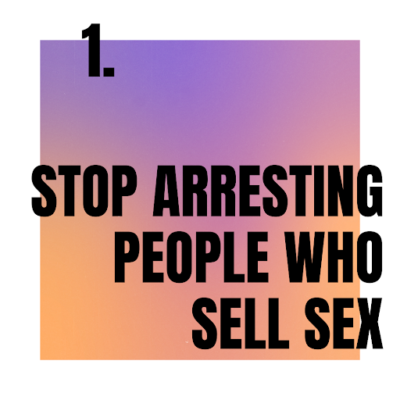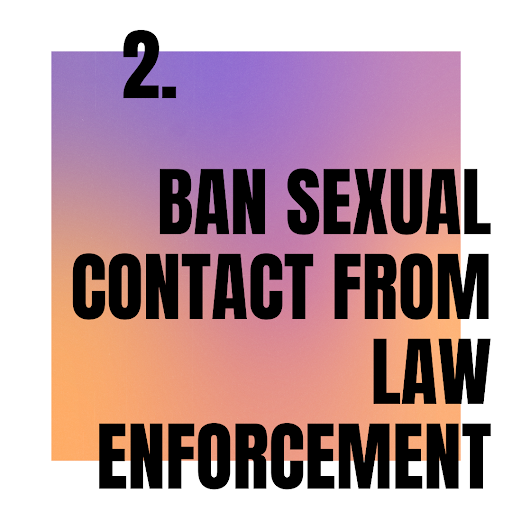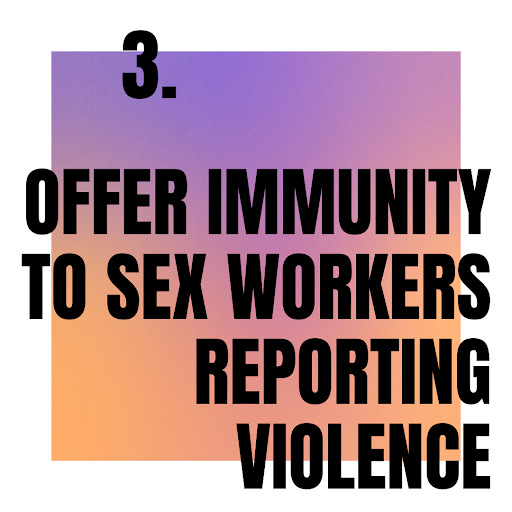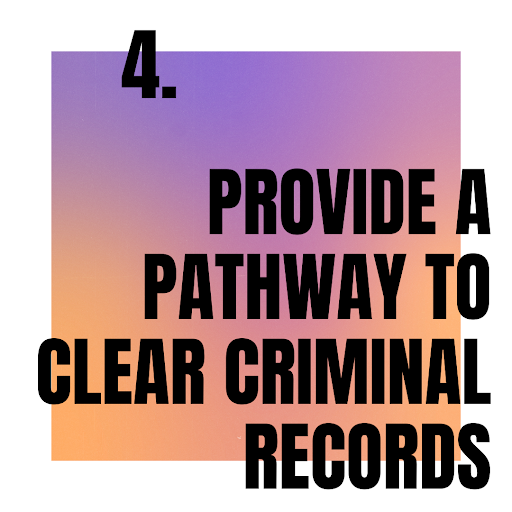On the Super Bowl, Safety, and Solidarity
Finding common ground in a time of crisis … and beyond
Every year, around this time, the airwaves in whatever city is hosting the Super Bowl are flooded with public service announcements about sex trafficking. Billboards go up. Police officers receive special training. Media asks organizations that work to reduce trafficking to comment on the “biggest sex trafficking event of the year.”
Every year we explain that this is not, in fact, the case. More importantly, we try to make the point that the hype often leads to a damaging response – arresting people who are directly selling sex. And yet every year the stories continue, the hype expands, and the harm happens. So now we are asking for your help.
A common ground…
Historically, the anti-trafficking and sex worker rights movements have struggled to find common ground and the disagreements have sometimes become heated. But this is one area we believe that both sides can agree upon. Our time, talent, and treasure is best invested toward supporting the direct needs of those with lived experience, as opposed to coercive intervention.
There are others – areas of agreement where we believe the sex workers rights movement and the anti trafficking movement can work together toward what should be a shared goal: The dignity of each and every human being and an end to violence against people in the sex trades.
With that in mind, we offer the following four policy proposals for everyone to unite around.
- DO NOT ARREST PEOPLE FOR SELLING SEXUAL SERVICES. PERIOD.
Arresting people for selling sexual services:
- Increases their vulnerability to trafficking.
- Burdens them with a criminal record that makes it harder for them to find safe housing and legal employment.
- Adds stigma to an already-stigmatized population.
- Disproportionately impacts Black and Brown survivors.

Traffickers, abusive family, and other perpetrators of harm often use threats of shame, arrest, and prosecution as weapons. Arresting and jailing people directly selling sex replicates this pattern of abuse, creating trauma for trafficking survivors and consensual workers alike.
On a very practical level, it is also a profoundly ineffective way to try to fight trafficking. Threatened with incarceration, people arrested for selling sexual services may feel coerced into saying whatever they think gets them home. For example, they may plead to crimes they did not commit. This impedes accurate investigations.
While some argue that arrests offer a gateway to people in trafficking situations to seek help, the reality is that people in trafficking situations are likely more afraid of their trafficker than of law enforcement, and many come from backgrounds where law enforcement is considered untrustworthy at best, dangerous or hostile at worst.
Bottom line: We cannot end trafficking and other forms of violence as long as as long as we continue to sanction systems, who are already failing the most vulnerable, to legally inflict further trauma.
- BAN SEXUAL CONTACT BETWEEN LAW ENFORCEMENT OFFICERS AND PEOPLE THEY MIGHT ARREST.
We can’t believe we have to say this, but here it is.

In 2020, the public learned that Homeland Security Investigations agents engaged in sexual contact with potential trafficking survivors as part of their investigations. This is not an isolated incident. In all but four states, it is legal for law enforcement officers to engage in sexual activity with people they may arrest. When investigators are allowed to engage in sexual contact with the targets of their human trafficking operations, they revictimize survivors already experiencing the horrors of human trafficking. When law enforcement officers coerce sexual activity from people they might or plan to arrest, it is sexual violence. When people in the sex trades are sexually assaulted by law enforcement officers under the guise of investigations, trust in law enforcement’s commitment to ending violence is damaged.
Damaged trust means that:
- Investigations of violent crimes (to include human trafficking, domestic violence and sexual assault) are hindered.
- Survivors of crime are less likely to seek or receive justice and/or services.
- Exploiters continue to see people who sell sexual services as “fair game,” targeting them for violence and crime.
Making it illegal for police officers to have sexual contact with people they might arrest ensures that the systems meant to protect victims do not become perpetrators of state-sanctioned sexual assault or human trafficking.
3. GIVE PEOPLE IN THE SEX TRADES WHO REPORT CRIMES IMMUNITY FROM PROSECUTION.

People in the sex trades often avoid reporting incidents to law enforcement for fear that coming forward will lead to their own arrest. This leaves them vulnerable as targets for harassment, stalking, assault, human trafficking, and other forms of violent victimization. For trafficking survivors, fear is leveraged into exploitation.
Providing people in the sex trades immunity from prosecution when they report crimes or violence against themselves or others allows them to report sexual violence, trafficking, and other crimes to the right authorities.
4. ENACT LAWS THAT PROVIDE SURVIVORS A PATHWAY TO CLEAR CRIMINAL RECORDS
Trafficking survivors are often arrested and prosecuted for a variety of criminal charges related to their trafficking. With a criminal record these survivors are less able to rebuild their lives due to impacts on their ability to find safe housing, find or maintain legal employment, continue their education, or vote. Survivors with criminal records may find their families torn apart or further impoverished, as their criminal records interfere with their ability to maintain custody of the children or access government benefits that keep their families from hunger and homelessness. Foreign nationals additionally face the dangers of losing their immigration status or even deportation as a result of any law enforcement engagement, arrest, or conviction.

Many states have some form of limited, conditional criminal records relief – such as relief for people who were minors at the time of the trafficking, or for charges related only to prostitution. Additionally, many of the mechanisms for seeking relief are prohibitively complex, expensive, and potentially retraumatizing. These laws must be revamped to include all charges directly connected to trafficking experience and they must offer a pathway that is actually usable.
Giving survivors legal options for expungement of records related to their trafficking gives them a better chance at achieving safety and security, and reduces traffickers’ leverage over them.
Human trafficking does not happen in a vacuum. It is the direct result of societal inequity, generational poverty, racism, the disruption of communities by violence, and criminalization of survival. All these societal shortcomings disproportionately harm people from marginalized communities and contribute to a higher statistical risk of trafficking as well as other forms of violence. We cannot arrest our way out of social problems. Attempts to do so leave vulnerable people more vulnerable, traffickers with more power, and real members of our communities struggling to maintain hope as they try to rebuild their lives. Our movements should not cause harm in the name of ending harm. We can and must do better.
National/International Organizations
SWOP Behind Bars
Freedom Network USA
Human Trafficking Legal Center
Global Alliance Against Traffic in Women
Human Rights Campaign
Woodhull Freedom Foundation
SWOP-USA
Reframe Health and Justice
The Sex Workers Project at the Urban Justice Center
URGE: Unite for Reproductive & Gender Equity
FORGE
Decriminalize Sex Work
GLITS, Inc.
We Are Dancers USA
National Center for Lesbian Rights
GMHC
The Advocates for Human Rights
Old Pros
Center for LGBTQ Economic Advancement & Research
The National LGBTQ Workers Center
Center for Disability Rights
The Well Project
Who Speaks For Me
U.S. People Living With HIV Caucus
National Working Positive Coalition
Positive Women’s Network USA
Sero Project
AIDS United
Unitarian Universalists for a Just Economic Community
Athlete Ally
StopTheDrugWar.org
National Association for Rational Sex Offense Laws
Regional/Local Organizations
Asian Pacific Islander Legal Outreach
Advocating Opportunity
Justice At Last
HIPS
Positive People Network, Inc.
Black and Pink, Massachusetts
Preble Street
VOCAL-NY
Mazzoni Center
Equality North Carolina
NC Coalition Against Human Trafficking
BAYSWAN (Bay Area Sex Worker Advocacy Network)
Unity Fellowship of Christ Church NYC
Verity ~ Compassion. Safety. Support.
The FL HIV Justice Coalition
Indivisible NJ5
PWN-USA Ohio
Haymarket Pole Collective
Occupy Bergen County (New Jersey)
Bergen County Immigration Strategy Group
St. Peter the Apostle Parish
LGBTQ Pop-up Center of Carrboro
SWOP Los Angeles
Friend to Friend, NC
SWOP Chicago
Housing Works
Chicago Alliance Against Sexual Exploitation (CAASE)
Student Alliance Fighting Exploitation
North Carolinians for Rational Sex Offense Laws
Rainbow Research
Individuals
Chris Croft Ash, Human Trafficking Survivor and Anti-Violence Advocate
Audrey Morrissey, My Life My Choice
Sally Frantzen, National Survivor Leader & Founder @ Fighting Against Trafficking Org
Charlie Tebow, LMSW, Trafficking Survivor, Licensed Master Social Worker
Tabytha Gonzalez
Rachel Niemiec MSN, FNP-BC, Nurse Practitioner & Trafficking Survivor
Emily Warfield, Survivor, sex worker, MSW student
Susie Baldwin, MD, MPH, FACPM
Kate Mogulescu, Associate Professor of Clinical Law, Brooklyn Law School
Elena Shih, University Center for the Study of Slavery and Justice Human Trafficking Research Cluster
Jessica Emerson, Director, Human Trafficking Prevention Project at the University of Baltimore School of Law
Professor Laura Murphy, Sheffield Hallam University, Helena Kennedy Centre for International Justice
Dr. Bianca D.M. Wilson, Senior Public Policy Scholar
Lauren Martin (Associate Professor, University of Minnesota) & Annie Hill (Assistant Professor, University of Texas, Austin), co-authors, “Debunking the Myth of ‘Super Bowl Sex Trafficking’: Media hype or evidenced-based coverage,” Anti-Trafficking Review, issue 13, 2019, pp. 13-29, https://doi.org/10.14197/atr.201219132.
Barbara Friedman, Associate Professor, Hussman School of Journalism and Media; Director, The Irina Project, UNC-Chapel Hill
Sandy Skelaney, Anti-trafficking consultant, Adjunct at Florida International University
Dr. Lara Gerassi, University of Wisconsin- Madison
Denise Brennan, Professor, Georgetown University
Kanani Titchen, MD, Adolescent Medicine
Prof. Bridgette Carr, Co-Director Human Trafficking Clinic University of Michigan Law School
Tonya E. Edmond, PhD, Associate Dean for Social Work, Brown School at Washington University in St. Louis
Danielle Kalil, Clinical Teaching Fellow, Human Trafficking Clinic, University of Michigan Law School
Jennifer Musto, Associate Professor of WGST, Wellesley College
Patrick L. Kerr, Ph.D., Licensed Clinical Psychologist, Charleston, WV
Ayako Miyashita Ochoa, Co-Director, UCLA Hub for Health Intervention, Policy and Practice
Professor Andrea J. Nichols
Caitlin Ryland, Attorney, NC
Bill Hirsh, Executive Director, AIDS Legal Referral Panel
Leah Arnold, Attorney, NC
Anna Maitland
Carson Osberg, Attorney, NC
Nell Brimmer, Attorney, GA, ME
TeAndra M. Miller, Attorney, N.C.
Margaret D Bordeaux
LB Klein, Researcher and Consultant, Catalytical Consulting LLC
Melissa Siegel-Barrios, MSB Consulting, LLC Founder
Jessica Van Meir, MPhil
Danielle Bastian, LCSW, Lecturer, University of Chicago Crown Family School of Social Work, Policy, and Practice
Elizabeth Ricks, Legal Director, Chicago House and Social Service Agency
Tami Haught, Sero Project Organizing and Training Coordinator
Kathleen Klein, Senior Immigration Attorney
Ventura Dennis, Senior Attorney
Kristin Daley
